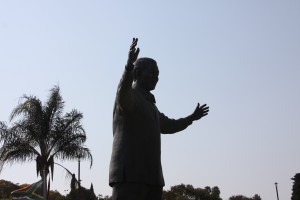The debacle surrounding a Wheaton College professor’s conviction that Christians and Muslims worship the same God has again raised the invidious compulsions of Christian exclusivism. To be sure, this is far from representative of the broad umbrella of Christian traditions. Dr. Larycia Hawkins’ offending statement invoked Pope Francis, who has unapologetically stated that Christians and Muslims worship the same God. Wheaton, an evangelical institution, alleges Dr. Hawkins’ belief contravenes its statement of faith.
I can sympathize with the Wheaton administration’s need to protect a brand based on religious belief and identity. The free practice of religion is rightly protected by law. But freedom of speech is, too, and Dr. Hawkins has every right to voice her beliefs. As tenured faculty she is surely entitled to the privileges and protections she has earned.
It’s unlikely that Hawkins’ statement is the only cause of offense given her spiritual practice in Advent of donning a hijab in solidarity with Muslims, who are increasingly targets of noxious right-wing political rhetoric in the United States. In this climate of a radicalizing right, Wheaton’s administration must surely be under tremendous political pressure not to alienate its conservative-leaning evangelical support base.
It would appear the administration’s condemnation of Hawkins, based on an interpretation of the school’s statement of faith, has more to do with contemporary political trends than a sober reading of theology centered on the teachings of Christ. There’s an apparent failure of recognizing the radical nature of the love Christ taught and demonstrated, especially for the marginalized and outcast. His ethic of loving God and loving neighbor seems to be lost amidst the clamor of vote-seeking fearmongers.
Nowhere in Wheaton’s statement of faith is there mention of other faiths and whether or not they worship the same God. There’s certainly no condemnation of other religions. It’s a positive statement of the evangelical faith the school aspires to and is clearly predicated on the particularity of Jesus Christ. While the statement is open to an exclusivist viewpoint, it also encourages proclamation of “God’s redemptive love to the ends of the earth by word and deed; by caring for all of God’s creation and actively seeking the good of everyone, especially the poor and needy.â€
The statement of faith does not condemn Muslims or cast aspersions on their religion. It is merely a statement of beliefs about God that form the underpinnings of evangelical faith.
To in any way imply that it captures fully the essence of the imminent and transcendent Holy One is to build a tower of Babel with the feeble blocks of language. To limit God to a statement of faith or creed would be to lose in an instant the very nature of God, who is uncontainable, wildly free to be whatever God will be. Remember Moses before the burning bush?
It’s no wonder so many people are losing faith in religion. The “dones†and the “nones†are tired of grasping at castles in the sky. An increasing number of active religious across the faiths and traditions are too. Beyond even a generous orthodoxy, the immanence and transcendence of that which is Holy and wholly beyond comprehension is being sought through authentic relationship with the other and in relationship with the world around.
I would encourage anyone who doubts whether Christians and Muslims worship the same God to engage in meaningful conversation with someone of the other faith – not about politics or the Middle East, but about the qualities of God and the spiritual practices that bring the other more truly into relationship with God. Come into the presence of the Divine with such a deep love and respect for the other that for a moment one’s most dearly held beliefs may be suspended in favor of listening deeply and openly to the other. To listen is to love.
In my experience, engaging in interfaith and ecumenical conversations has helped develop my own sense of who I am in relation to the (Un)Knowable One I worship. It has not weakened my belief in the particularity of Jesus the Christ or my Christian faith, but it has opened my heart and spirit to new experiences of the Divine.
Surely in a world as fragmented and violent as ours is the path to peace is through compassionate respect for people who approach and articulate their faith in ways that differ from our own. Let’s not limit God through narrow interpretations of creeds or statements, but strive to love more deeply, live more generously, and counteract fear by engaging the other.


